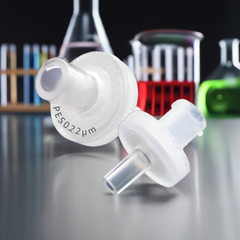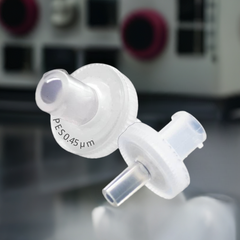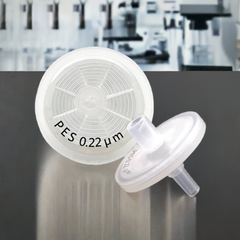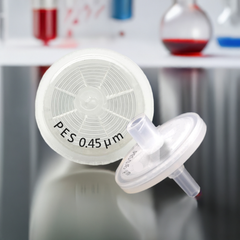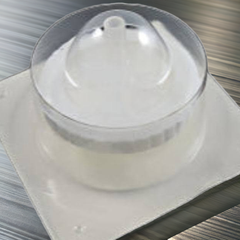Polyethersulfone (PES) Syringe Filters: Reliable, Hydrophilic Filtration for Sensitive Applications
If you've ever wished life-life filtering devices could be a bit smarter, PES syringe filters are your answer. Crafted from polyethersulfone membrane, these filters are remarkably hydrophilic, offering ultra-low protein binding and rapid flow—ideal for labs working with tissue culture, proteins, buffers, and more.
In this in-depth guide, you’ll discover:
-
What makes a polyethersulfone pes membrane filters so effective
-
Features of sterile PES syringe filters versus non-sterile
- Choosing the right pore size, diameter, and housing
- Best practices and real-world applications
- A comprehensive FAQ to answer your questions
Why Choose Polyethersulfone (PES)?
Polyethersulfone (PES) is a high-performance polymer celebrated for:
- Hydrophilicity—natural water-wet filtering with no pre-wetting required
- Low protein binding, making it safe for sensitive biological samples
- Thermal and mechanical stability, even under high-flow or elevated temp conditions
- Fast flow rates and minimal extractables, which help retain analyte integrity
Thanks to these features, PES filters consistently rank among the top choices for syringe filter membranes, especially in biotech and lab environments.
Hydrophilic, Sterile, and Protein-Safe
-
Hydrophilic PES membranes deliver quick filtration and reduce clogging, particularly for aqueous and protein-rich samples.
-
Sterile PES syringe filters (such as 33 mm sterile, 0.22 µm variants) are ideal for clinical or biological workflows where sterility is crucial.
-
Non-sterile PES syringe filters (13 mm/25 mm, 0.22 µm and 0.45 µm) are cost-effective for general-use filtration
No need to worry about losing precious protein samples—PES keeps your biomolecules intact.
Sizes, Pores & Compatibility Overview
Available Formats
-
Diameters: 13 mm, 25 mm, 33 mm
-
Pore Sizes: 0.22 µm (sterility) & 0.45 µm (particulate removal)
-
Packaging: Bulk (e.g., 100-packs non-sterile), individual sterile packs (e.g., 50 for 33 mm).
Compatibility Notes
- Suited for aqueous buffers, cell culture media, proteins, nucleic acids.
- Limited toward harsh organic solvents—great for up to low-organic content only.
-
Ideal for chromatography prep, protecting expensive HPLC/UHPLC columns.
Technical Highlights & Best Practices
Here’s a snapshot of performance and design:
-
Low hold-up volume: <20–100 µL, depending on diameter
-
Pressure & Temp Resilience: Up to 90 °C and ~87 psi
-
Durability: Stands up well over repeated use and sterilization processes
Best-practices:
- Use Luer-lock fittings to secure filters during processing.
- Pre-rinse with a buffer to flush out air bubbles and stabilize flow.
- Discard initial flow to ensure accuracy in analytical work.
- For samples with high particle loads, add a glass-fiber or prefilter stage.
-
Store unopened filters in a dry, sealed container to preserve sterility.
Common Lab Applications
Polyethersulfone syringe filters are go-to tools for:
- Cell culture sterilization (media, supplements)
- Protein or nucleic acid prep for assays or purification
- HPLC/GPC chromatography pre-sample filtration
- Sterile clarification of aqueous pharmaceutical solutions
Their low binding and clean flow make them ideal for high-sensitivity tasks.
FAQ – Answering Your PES Questions
What exactly is PES filter membrane?
PES is a hydrophilic polymer that resists temperature and protein adhesion—perfect for sensitive lab workflows.
Are PES filters reusable?
Generally no. Designed as single-use cartridges to avoid contamination, though their structure is robust enough to handle typical lab handling.
Can I use PES filters for sterilizing cell culture?
Yes. Especially the sterile PES syringe filters, which are RNase/DNase-free and individually wrapped.
Which pore size should I pick?
Use 0.22 µm for sterility and clarity, or 0.45 µm to remove particulates during prep work.
Can PES work with some organic solvents?
Yes—if they’re aqueous-based or low solvent. For full-strength organics, you’ll need PES alternatives, such as PTFE.
What is “50 PES” on filters?
Typically refers to pack size (e.g., 50 sterile filters per pack) or the filter’s pore size designation.
Why PES Is a Smart Lab Choice
- Hydrophilic and low-binding: retains proteins and ensures clean sampling
- Sterile packs preserve sample integrity
- Varied formats offer flexibility in pore sizes and sizes
- Fast flow, sturdy polymer: great for high-volume, time-sensitive work
- Lab trust: used by major distributors like Pall, Corning, Sterlitech
OEM & Procurement (Polyethersulfone Suppliers)
Looking for volume or custom solutions? Companies like Sterlitech, Membrane Solutions, Corning, and Pall supply PES membranes and filters. They offer OEM services, custom sizes, and quality control-certified products.

